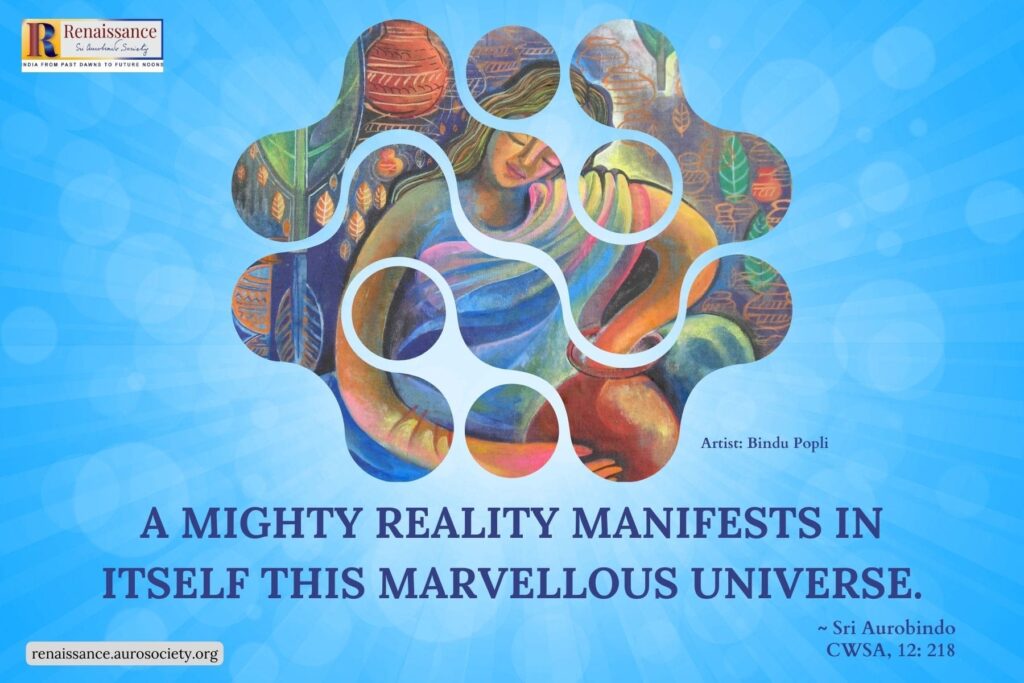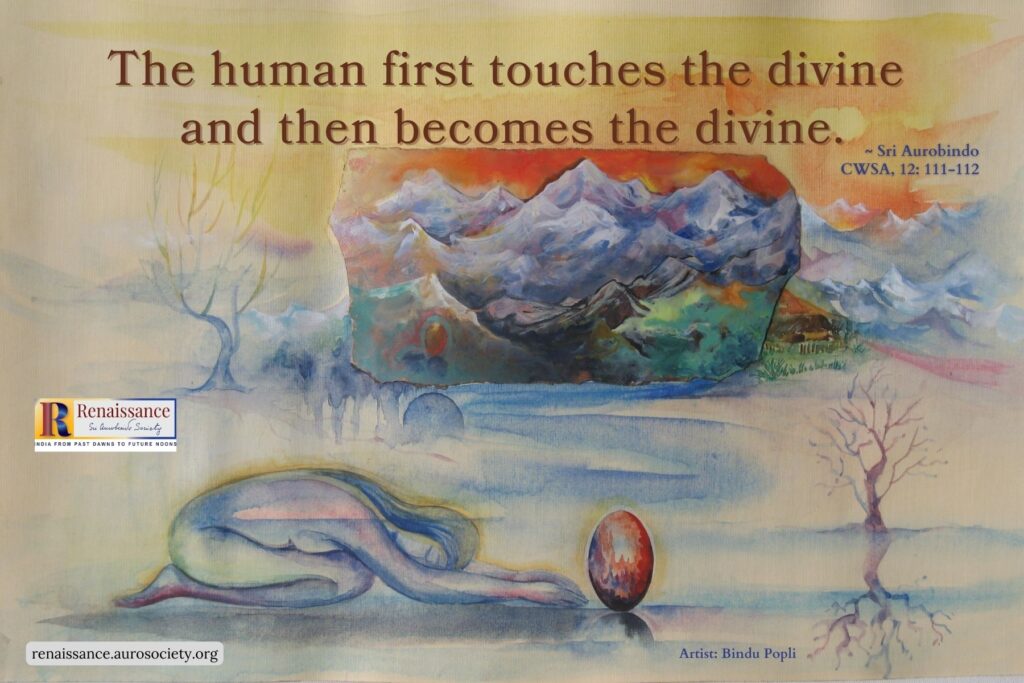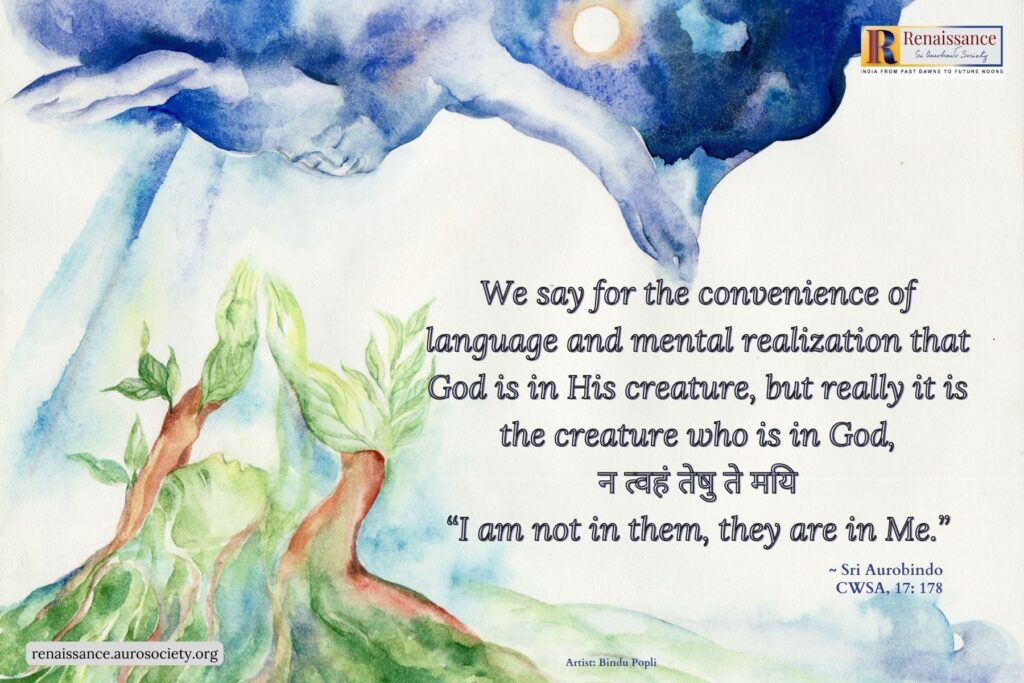Editor’s note: In these excerpts selected from Sri Aurobindo’s ‘The Synthesis of Yoga‘, we learn of the inner psychological truth behind Chaturvarna. But our main focus here is on the Kshatriya turn of the nature and the integral perfection it can arrive at with the Yoga of Self-perfection. Only a few formatting revisions have been made by the editors for the ease of online reading, with no alteration in the text.

Excerpts from the chapter ‘Soul-Force and the Fourfold Personality’
The Godhead, the spirit manifested in Nature appears in a sea of infinite quality, Ananta-guna. But the executive or mechanical Prakriti is of the threefold guna, sattwa, rajas, tamas, and the Ananta-guna, the spiritual play of infinite quality, modifies itself in this mechanical nature into the type of these three gunas.
And in the soul-force in man this Godhead in Nature represents itself as a fourfold effective Power, catur-vyūha, a Power for knowledge, a Power for strength, a Power for mutuality and active and productive relation and interchange, a Power for works and labour and service, and its presence casts all human life into a nexus and inner and outer operation of these four things.
The ancient thought of India conscious of this fourfold type of active human personality and nature built out of it the four types of the Brahmana, Kshatriya, Vaishya and Shudra, each with its spiritual turn, ethical ideal, suitable upbringing, fixed function in society and place in the evolutionary scale of the spirit.
As always tends to be the case when we too much externalise and mechanise the more subtle truths of our nature, this became a hard and fast system inconsistent with the freedom and variability and complexity of the finer developing spirit in man.
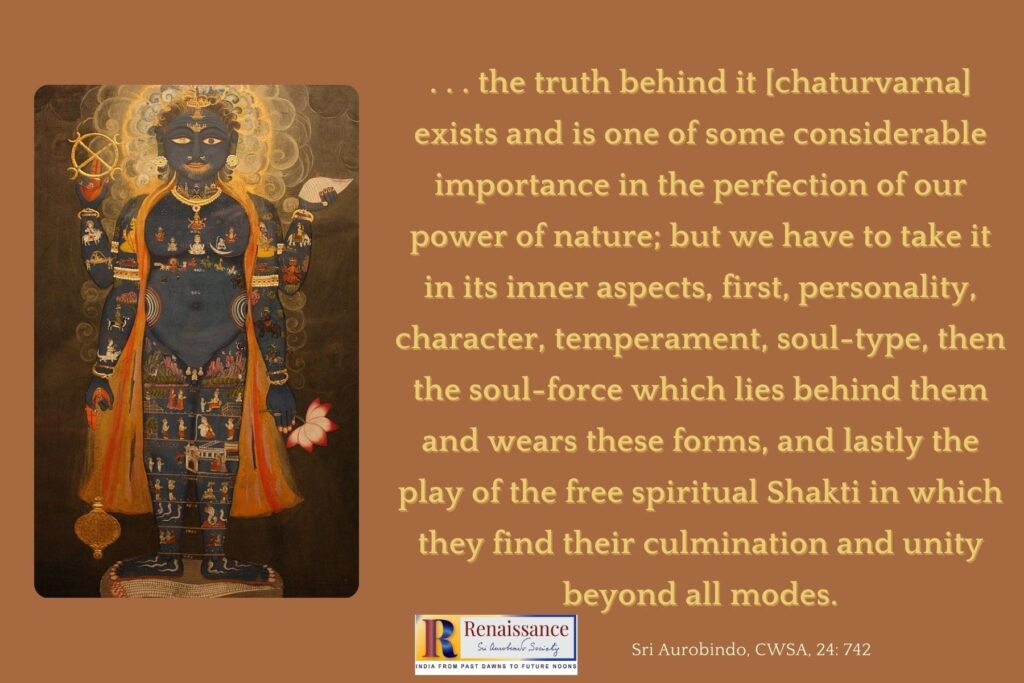
The psychological truth behind the Chaturvarna
Nevertheless the truth behind it exists and is one of some considerable importance in the perfection of our power of nature; but we have to take it in its inner aspects, first, personality, character, temperament, soul-type, then the soul-force which lies behind them and wears these forms, and lastly the play of the free spiritual Shakti in which they find their culmination and unity beyond all modes.
For the crude external idea that a man is born as a Brahmana, Kshatriya, Vaishya or Shudra and that alone, is not a psychological truth of our being.
The psychological fact is that there are these four active powers and tendencies of the Spirit and its executive Shakti within us and the predominance of one or the other in the more well-formed part of our personality gives us our main tendencies, dominant qualities and capacities, effective turn in action and life.
But they are more or less present in all men, here manifest, there latent, here developed, there subdued and depressed or subordinate, and in the perfect man will be raised up to a fullness and harmony which in the spiritual freedom will burst out into the free play of the infinite quality of the spirit in the inner and outer life and in the self-enjoying creative play of the Purusha with his and the world’s Nature-Power.
Also see:
Sri Aurobindo on the Aryan Ideal of Courage
The most outward psychological form of these things is the mould or trend of the nature towards certain dominant tendencies, capacities, characteristics, form of active power, quality of the mind and inner life, cultural personality or type.
The turn is often towards the predominance of the intellectual element and the capacities which make for the seeking and finding of knowledge and an intellectual creation or formativeness and a preoccupation with ideas and the study of ideas or of life and the information and development of the reflective intelligence. According to the grade of the development there is produced successively the make and character of the man of active, open, inquiring intelligence, then the intellectual and, last, the thinker, sage, great mind of knowledge. . . .
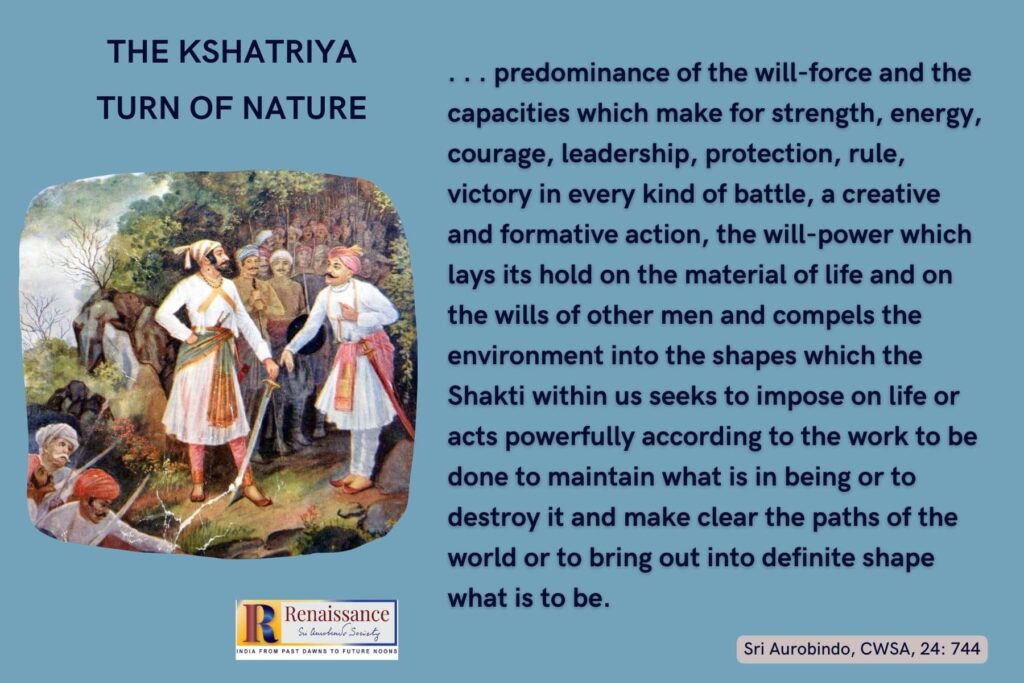
The Turn of the Nature toward Strength, Courage, Leadership
On the other hand the turn of the nature may be to the predominance of the will-force and the capacities which make for strength, energy, courage, leadership, protection, rule, victory in every kind of battle, a creative and formative action, the will-power which lays its hold on the material of life and on the wills of other men and compels the environment into the shapes which the Shakti within us seeks to impose on life or acts powerfully according to the work to be done to maintain what is in being or to destroy it and make clear the paths of the world or to bring out into definite shape what is to be.
This may be there in lesser or greater power or form and according to its grade and force we have successively the mere fighter or man of action, the man of self-imposing active will and personality and the ruler, conqueror, leader of a cause, creator, founder in whatever field of the active formation of life.
The various imperfections of the soul and mind produce many imperfections and perversities of this type,—the man of mere brute force of will, the worshipper of power without any other ideal or higher purpose, the selfish, dominant personality, the aggressive violent rajasic man, the grandiose egoist, the Titan, Asura, Rakshasa.
“Things that Build the Make of the Kshatriya”
But the soul-powers to which this type of nature opens on its higher grades are as necessary as those of the Brahmana to the perfection of our human nature.
- The high fearlessness which no danger or difficulty can daunt and which feels its power equal to meet and face and bear whatever assault of man or fortune or adverse gods,
- the dynamic audacity and daring which shrinks from no adventure or enterprise as beyond the powers of a human soul free from disabling weakness and fear,
- the love of honour which would scale the heights of the highest nobility of man and stoop to nothing little, base, vulgar or weak, but maintains untainted the ideal of high courage, chivalry, truth, straightforwardness, sacrifice of the lower to the higher self, helpfulness to men, unflinching resistance to injustice and oppression, self-control and mastery, noble leading, warrior-hood and captainship of the journey and the battle,
- the high self-confidence of power, capacity, character and courage indispensable to the man of action,
—these are the things that build the make of the Kshatriya.
To carry these things to their highest degree and give them a certain divine fullness, purity and grandeur is the perfection of those who have this Swabhava and follow this Dharma. [. . .]
The Greater Perfection
None of these four types of personality can be complete even in its own field if it does not bring into it something of the other qualities. . .
The man of power must illumine and uplift and govern his force and strength by knowledge, light of reason or religion or the spirit, otherwise he becomes the mere forceful Asura,—must have the skill which will help him best to use and administer and regulate his strength and make it creative and fruitful and adapted to his relations with others, otherwise it becomes a mere drive of force across the field of life, a storm that passes and devastates more than it constructs,—must be capable too of obedience and make the use of his strength a service to God and the world, otherwise he becomes a selfish dominator, tyrant, brutal compeller of men’s souls and bodies. . . .
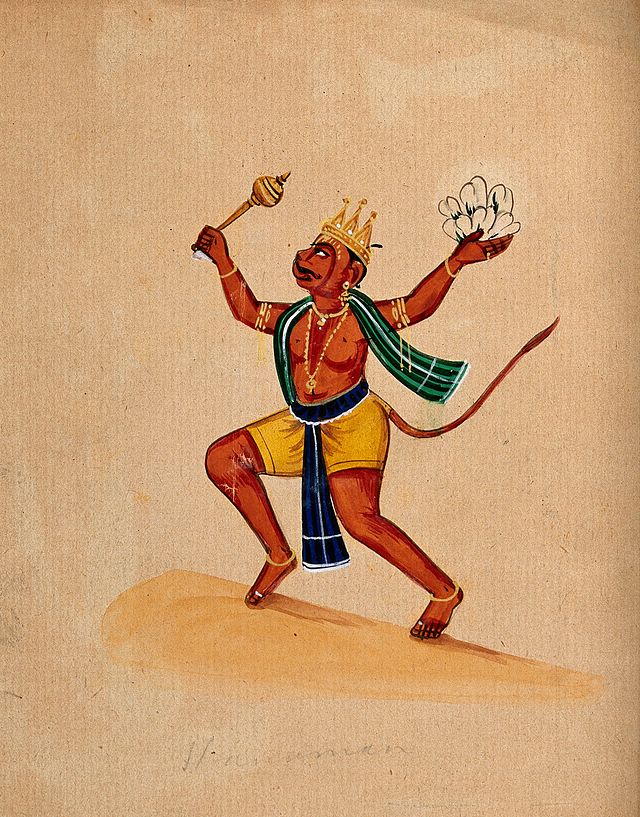
But the greater perfection of man comes when he enlarges himself to include all these powers, even though one of them may lead the others, and opens his nature more and more into the rounded fullness and universal capacity of the fourfold spirit.
Man is not cut out into an exclusive type of one of these dharmas, but all these powers are in him at work at first in an ill-formed confusion, but he gives shape to one or another in birth after birth, progresses from one to the other even in the same life and goes on towards the total development of his inner existence. Our life itself is at once an inquiry after truth and knowledge, a struggle and battle of our will with ourselves and surrounding forces, a constant production, adaptation, application of skill to the material of life and a sacrifice and service.
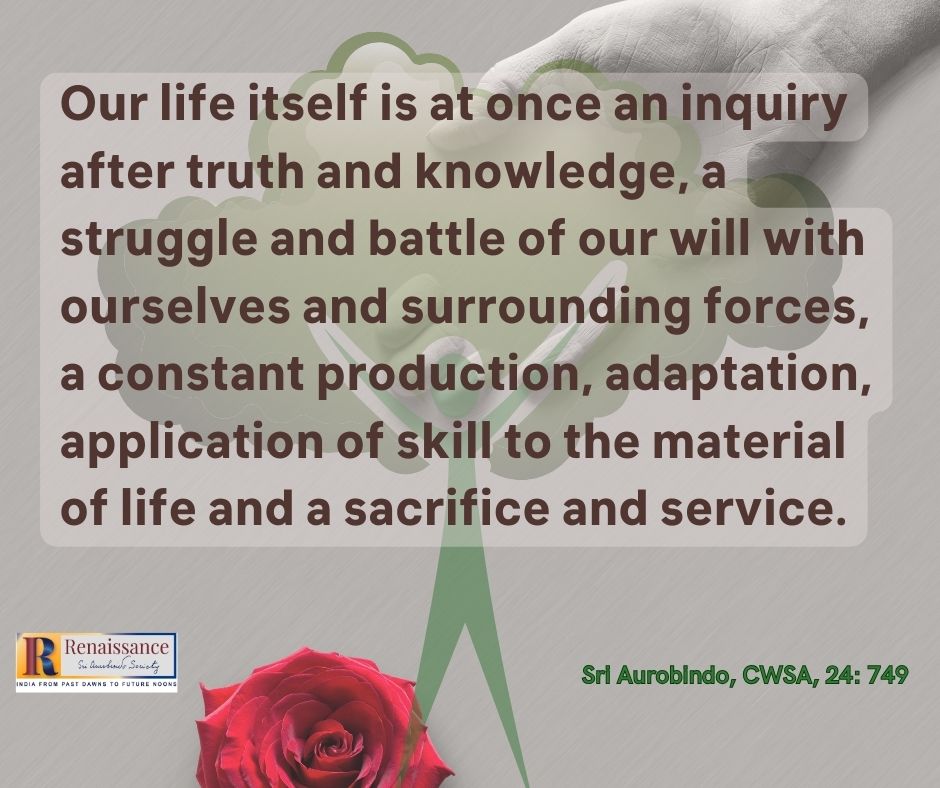
Toward an Integral Perfection
These things are the ordinary aspects of the soul while it is working out its force in nature, but when we get nearer to our inner selves, then we get too a glimpse and experience of something which was involved in these forms and can disengage itself and stand behind and drive them, as if a general Presence or Power brought to bear on the particular working of this living and thinking machine.
This is the force of the soul itself presiding over and filling the powers of its nature. . . The Yoga of self-perfection brings out this soul-force and gives it its largest scope, takes up all the fourfold powers and throws them into the free circle of an integral and harmonious spiritual dynamis….
The godhead, the soul-power of will and strength rises to a like largeness and altitude.
An absolute calm fearlessness of the free spirit, an infinite dynamic courage which no peril, limitation of possibility, wall of opposing force can deter from pursuing the work or aspiration imposed by the spirit, a high nobility of soul and will untouched by any littleness or baseness and moving with a certain greatness of step to spiritual victory or the success of the God-given work through whatever temporary defeat or obstacle, a spirit never depressed or cast down from faith and confidence in the power that works in the being, are the signs of this perfection.
~ Sri Aurobindo, CWSA, Vol. 24, pp. 744-751

~ Design: Beloo Mehra

